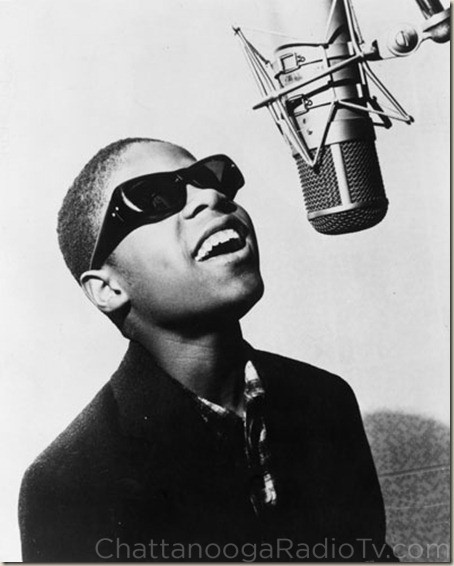Here’s a great trivia question for you, the next time you want to stump your friends. “Who had a #1 record before the Beatles, the Beach Boys and the Rolling Stones, and is still performing today? And by the way, this performer is several years younger than any of those guys.” The answer is Stevie Wonder, who turns 65 today. (By the way, Stevie has performed at least twice in Chattanooga, both times at the Memorial Auditorium. He headlined shows there on October 29, 1963, and on February 11, 1970).
Before he turned 13, he had recorded “Fingertips” which topped the charts in the spring of 1963. By then, he had already mastered the harmonica, piano, bass and drums. And “Little Stevie Wonder,” as he was known back then, could sing like crazy too.
Born six weeks premature, Stevland Morris was blind at birth. Talk about a rough childhood. His mother Lula Hardaway insisted he get no special treatment. She wanted him to be raised just like the other boys, including his siblings. So he played hard in the fields and streets of Saginaw, Michigan, often nursing injuries from running into things or falling into ditches. Mom lived a tough life too. Her husband, who may or may not have been Stevie’s dad, forced her to sell her body. Some of the proceeds from this illicit activity were used to buy Stevie toy musical instruments, and eventually a real harmonica and drum set.
Stevie’s church performances became the talk of Saginaw, and when word spread to Detroit, about 100 miles away, Motown Records founder Berry Gordy and his promotion team called Little Stevie the “8th wonder of the world,” and his showbiz name was sealed. Gordy recorded Stevie’s “Fingertips” performance before a live audience, and watched it sail to the top of the charts. Gordy, known as a stern taskmaster, took the teen under his wings, and made sure he stayed out of trouble during his teen years. He hired Ted Hull, a teacher of the blind (and a Chattanooga native) to be Stevie’s tutor and road companion. Even in his teen years Stevie loved the ladies, and part of Hull’s job was keeping a close eye on Stevie. Due to his blindness, the clock had no relevance to Stevie: there was no day or night. So Hull had to stay on constant guard to ensure that the precocious teenager wasn’t entertaining female guests in his hotel room.
When Stevie was 17, he had a huge crush on Angie Satterwhite, who he called the first love of his life. When you hear the songs “Uptight (Everything’s Alright)” and “I Was Made To Love Her,” they’re about Angie. In the latter song, he wrote these words: “I was made to love her, built my world all around her….had a childhood sweetheart, we were always hand in hand.” That same year, the teenager wrote “My Cherie Amour” about Angie: “lovely as a summer day….how I wish that you were mine.” But the relationship didn’t last, and three years later, he wrote “It’s a Shame,” recorded by the Spinners, which was about Angie’s cheating: “It’s a shame, the way you mess around with your man…Why do you use me, try to confuse me? How can you stand to be so cruel…”
So, to sum up, barely out of his teens, he had written or recorded EIGHTEEN top-20 hits, selling millions of records, and appearing in sold-out concerts worldwide. All of this during the British Invasion of the 1960s, some pretty tough competition. How would he top this?
By owning the 1970s, that’s how. Album after album, each packed with hit songs, one right after another. “You Are The Sunshine of My Life.” “Living For The City.” “Sir Duke.” And in my opinion, maybe the best all-around song of the decade, start to finish. “Superstition” had everything. From the first notes on the drum, to the futuristic-sounding keyboard (I thought it was a guitar) that Stevie himself played throughout the song. Great vocals, great lyrics, great beat. It simply doesn’t get any better than “Superstition.”
Through it all, he’s been a busy man, in every sense of the word. He has nine children with five different women. One of those children, Aisha is now 40 and performs with her dad in concert. She’s the baby girl you hear on “Isn’t She Lovely,” his joyful ode to fatherhood. He’s written hits for other artists: “Tears of A Clown” for Smokey Robinson, “Tell Me Something Good” by Rufus, and most amazingly, “Until You Come Back To Me” for Aretha Franklin (he wrote this at age 13!)
He was almost killed in a car wreck at the age of 23, and says the near-death experience and the challenges of recuperating helped him understand the suffering of people worldwide. The songs that followed reflected more social activism, and less romance.
Someday, someone will make a movie about the life and career of Stevie Wonder. What a story it will be. Happy Birthday Stevie, and thanks for all those memorable grooves. You are the soundtrack of my life.
(Much of the information in this story is from Mark Ribowksky’s great 2010 book, “Signed, Sealed, and Delivered, the Soulful Journey of Stevie Wonder.”




